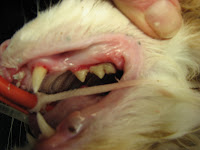 This week I'm talkin' teeth. No I am not talking about those wind-up chattering teeth although they are pretty funny. I'm talking about National Pet Dental Health Month which happens every February. Nothing more exciting then talking about gum disease, eh? If you get look around online, I think just about every veterinary blog will mention dental health this month. Why? Well, frankly because it is important and it is probably the number one disease veterinarians treat in older pets.
This week I'm talkin' teeth. No I am not talking about those wind-up chattering teeth although they are pretty funny. I'm talking about National Pet Dental Health Month which happens every February. Nothing more exciting then talking about gum disease, eh? If you get look around online, I think just about every veterinary blog will mention dental health this month. Why? Well, frankly because it is important and it is probably the number one disease veterinarians treat in older pets.Now I'm not much different than everyone else. I hate the thought of the dentist. OK, strike that. I like my dentist. He's really a very nice guy. I hate the thought of GOING to the dentist. But I see the effects of bad rotting teeth everyday so that makes going to the dentist a little more bearable.
The truth is that dental disease causes lots of other health problems such as heart, liver and kidney disease. Just think about it. A dog or cat has a bad rotten tooth and they are breathing in and swallowing all that bacteria in their mouth 24 hours a day, 7 days a week, 356 days a year. That cannot be good for the body and it isn't.
What are the symptoms of a bad tooth? Well SOMETIMES bad breath, drooling, pawing at the mouth, but most often the symptom is .......... NOTHING! So how am I so sure that the pain of a bad tooth is real? I hear it time after time after time. I remove a bad tooth and then two weeks later, I talk to the pet's owner and find out the dog or cat is doing things that they hadn't done in months or years. They are more active. They are playing more. Little changes that weren't really noticeable before, but in hindsight they stand out. Dogs and cats in pain don't complain. They just live with their pain and it is up to us to be on the look out for something that is painful and they can't tell us about it.
Just so you can see what a tartar covered tooth looks like compared to a clean tooth, here are a couple of before and after teething cleaning pictures from a cat this week. In the after picture, the rear tooth still looks nasty because of all the gum disease, but the tooth is white and clean.
before cleaning
after cleaning
So pull your dog's or cat's lip back and look at those rear teeth. You don't need to get them to open their mouth at all. Just pull back the lip. Is the tooth white or brown? If it is brown, please take your pet to your veterinarian to have it checked further. In fact, all pets should have a yearly exam to pick up tooth and other problems early before they cause great pain to both the pet and the pocketbook. Let's treat tooth disease when the pain to both pet and wallet are minimal.










Hi Dr Di,
ReplyDeleteMy boy Rock seems to be slobbering a little more than usual. I am used to slobber, he is a bullmastiff but he sometimes can leave quite a puddle. He is nine + years old.
I have had him for a little over three years and have never had his teeth cleaned. So I took him to our vet but the Vet says his teeth are real nice and clean. I explained about the slobbering and the vet did a quick check again and found nothing. It seems sometimes Vets don't want to schedule things if they don't see a cause. For example Rocky was wheezing allot and I took him to the vet and they gave him a check up but found nothing wrong. Three months later he was still wheezing so I called the vet again to make an appointment. I told the receptionist he is still wheezing and I wanted him to have a chest x-ray and she said that is up to the doctor. So I told the receptionist I don't care what the doctor will say, I want a chest x-ray for Rocky. Long story short they found some congestion on the lungs from the x-ray.
I am not a doctor and I try to let the doctors do their job and I sure don't want to be a pain in the butt but with things like the teeth or if I feel there is a problem should I then demand a procedure be done even if the vet thinks Rock is fine?
Hi Don, is the slobbering something new? Bullmastiff's do drool alot anyway. If you think something is wrong in his mouth, maybe a second opinion at a vet that specializes in dentistry? Nothing wrong with second opinions. ~DrDi
ReplyDeleteHi DrDi,
ReplyDeleteThank you for the suggestion.
The slobbering is not new, the excessive slobbering is new. When I say excessive I mean the puddle he leaves is like pouring about four glasses of water. You can wring out whatever he slobbered on and it will drip water. It does not always happen but I would say he started this slobbering about 6 months ago and has had about four or five very heavy episodes.
He also started slobbering lots more when he eats a chew bone. It stops after he is done but the increased slobber is very noticeable.
He does have those screwed up bullmastiff teeth.
Front teeth are very crooked, and jammed into his mouth at bizarre angles. He also has lots of hangy flesh around the back teeth. I often wonder if his gums may be swollen and they get cut a bit easier, hence the added slobber but as our vet said he is fine so I never researched it.
Where does one find a good vet that specializes in dentistry?
Our blue heeler (9 1/2 yrs) and small Amercian Eskimo (7 yrs) had their cleaned last month. Their teeth look amazing and breath smells so much better! I'm so happy I had it done for them. Chloe, the Amercian Eskimo was born on a rotten day. She has had a number of health issues - collapsed trachea (there's a post)discovered before she was a year old, lost her top teeth playing tug of war with the dogs before she was three years old. In March I saw x-rays of her enlarged heart! She is losing her hearing, although I'm the one that has diagnosed her hearing loss. I took her for a cleaning because her teeth and breath were that of a very old dog. I thought she had gum disease but the Vet didn't mention any issues with her gums. She did however have a cracked molar, all the way to the root. They pulled that tooth and told me it's good that we found it now instead of after it decayed or absessed.
ReplyDeleteGlad to hear your dogs' mouths are smelling better. Dental health is so so important to overall health and well being. Good for you for recognizing a problem early on. Dr.Di.
ReplyDeleteDon, if you go to the American Veterinary Dental College web site at http://www.avdc.org, they have a list of veterinarians that specialize in dentistry. Dr.Di.
ReplyDelete